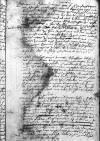List #4125
Ioannes DANTISCUS do [Elbing Town Council?]Heilsberg (Lidzbark Warmiński), 1539-03-15
Rękopiśmienne podstawy źródłowe:
| ||||
Tekst + aparat krytyczny + komentarzZwykły tekstTekst + komentarzTekst + aparat krytyczny
Unsern(n) etc. Ersame etc.
Was wir vonn superinscribed in place of crossed-out uns⌈uns wir von(n) wir vonn superinscribed in place of crossed-out uns⌉

 AAWO, AB, D. 7, f. 82r (t.p.)
AAWO, AB, D. 7, f. 82r (t.p.)